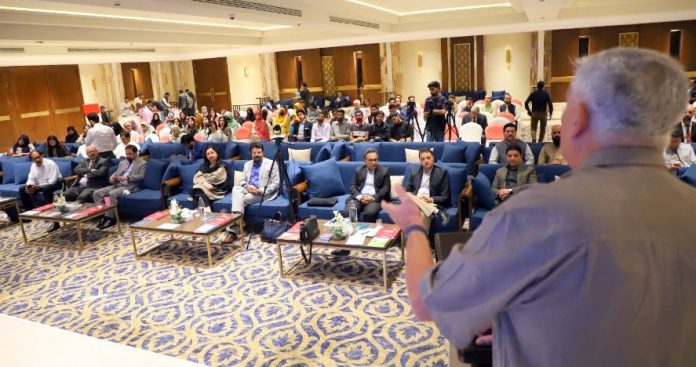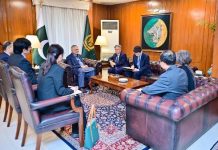ISLAMABAD, OCT 2 /DNA/ – The Pakistan Institute of Development Economics (PIDE) proudly marks five transformative years under the leadership of Dr. Nadeem Ul Haque as Vice Chancellor. Since his appointment in October 2019, Dr. Haque has spearheaded innovative reforms in economic policy research and public policy discourse, positioning PIDE as a leading public sector think tank in Pakistan and globally.
Over the past five years, Dr. Haque’s leadership has revitalized PIDE, aligning its research with pressing macroeconomic and governance challenges. His dynamic approach reshaped the institute’s research agenda, focusing on crucial areas such as economic growth, urban development, regulatory reform, energy policy, education, healthcare, and public sector management. His groundbreaking work on the cost of bureaucracy and regulatory burdens has been widely recognized by policy circles and academics worldwide, fostering greater dialogue between policymakers, scholars, and international institutions. These contributions have played a pivotal role in shaping Pakistan’s policy landscape.
Under Dr. Haque’s stewardship, PIDE expanded its platforms for knowledge dissemination, including books, the renowned Pakistan Development Review journal, policy briefs, and academic conferences. Initiatives such as the EconFest and PIDE’s YouTube channel have extended the institute’s outreach, engaging a diverse audience beyond academia, including policymakers and the general public. Dr. Haque’s tenure also saw the launch of the Research for Social Transformation and Advancement (RASTA), the largest public policy research grant program in Pakistan. This initiative, aimed at fostering local research and solutions, has connected over 65 universities and 3,200 researchers, creating a robust knowledge network. This program is pivotal in generating high-quality, evidence-based research that informs policy decisions across the country.
With a vision for inclusive academic dialogue, Dr. Haque organized the prestigious Annual General Meeting and Conference of the Pakistan Society of Development Economists (PSDE) across multiple regions, including Peshawar, Quetta, and Multan. This outreach has strengthened ties between academia, policymakers, and development practitioners nationwide.
The Pakistan Institute of Development Economics (PIDE) proudly celebrates five years of driving reason, rigor, and research in shaping evidence-based policies. Reflecting on the institute’s journey, Dr. Nadeem Ul Haque, Vice Chancellor of PIDE, emphasized the pivotal role PIDE has played in addressing Pakistan’s socio-economic challenges through independent research. He reaffirmed the institute’s unwavering commitment to fostering data-driven solutions for national development.
“PIDE has always championed ideas that drive change and progress. Through relentless dedication and a focus on evidence-based research, the institute has contributed significantly to Pakistan’s policy-making process,” Dr. Haque stated. He further stressed the importance of embracing innovative ideas, encouraging a collective shift in mindset away from dependence on government alone, and towards individual responsibility and ownership for meaningful progress.
PIDE continues to cultivate a thriving network of knowledge, connecting researchers, policymakers, and practitioners to create sustainable growth. “Ideas survive through networks, and knowledge thrives through connections,” Dr. Haque remarked, acknowledging PIDE’s role in fostering these vital intellectual exchanges.
Dr. Durre Nayab, former Director of Research and Pro Vice-Chancellor of PIDE, presented a comprehensive research showcase, highlighting the institution’s achievements over the past five years.
She said that since 2019, PIDE has significantly diversified its research output, introducing a variety of publications including monographs, policy viewpoints, knowledge briefs, PIDE Analytics, and webinar briefs. The institute’s innovative approach has also led to the launch of discourse magazines, animated videos, and documentaries, making research more accessible and impactful for a wider audience.
PIDE’s research spans crucial areas of Pakistan’s socio-economic development, focusing on cities and urban development, public sector management, agriculture and real estate markets, power sector reform, fiscal policy, youth opportunities, housing, and foreign aid. By addressing these diverse themes, PIDE remains dedicated to generating evidence-based policy research that influences sustainable solutions to national and global challenges.
The institute’s digital presence has grown significantly, with over 540 webinars featuring 32 Nobel Laureates and international academicians. PIDE’s YouTube platform has produced 1,091 videos, attracting 2.2 million views and over 215,000 hours of watch time, cementing its role as a leader in digital engagement and knowledge dissemination.
The event also featured several panels on key topics, with active participation from leading experts:
The Macroeconomy panel, moderated by Mahmood Khalid, focused on concurrent issues and reforms needed to stabilize Pakistan’s economy. Speakers Hafsa Hina, Uzma Zia, and others, presented actionable insights on fiscal policy, inflation control, and economic growth.
The Regulatory Burden & Sludge panel, moderated by Ahmed Waqar Qasim, featured experts like Nasir Iqbal and Usman Qadir, who critically examined Pakistan’s regulatory environment and called for streamlined processes to reduce inefficiencies in governance.
The session on Opportunities and Digital Rights, moderated by Shahid Mehmood, brought attention to the increasing importance of digital transformation in Pakistan, with panelists like Fizzah Khalid Butt and Henna Ahsan advocating for inclusive digital policies.
The Cities as Engines of Growth session emphasized the role of urban centers in driving economic progress. Moderated by Muhammad Shaaf Najib, panelists such as Saba Anwar and Lubna Hassan discussed the need for sustainable urban planning and infrastructure development.
The final panel on Markets: Energy, Agriculture & Real Estate featured insightful discussions by experts like Afia Malik and Abedullah Anjum, who highlighted the critical challenges and opportunities in Pakistan’s key markets.
A key highlight of the day was the Grand Conversation with Nobel Laureate Michael Spence, moderated by Nadeem Ul Haque. Spence offered valuable insights on Development Strategies in a More Complex and Difficult Global Economy, emphasizing the importance of strategic reforms in emerging markets like Pakistan. His discussion provided global context to Pakistan’s challenges, offering a roadmap for navigating a complex global economic environment. Professor Spenser greatly appreciated the work PIDE has produced during Dr Nadeem’s tenure and wished that the successor would keep this momentum going for larger impact on policy decisions.












